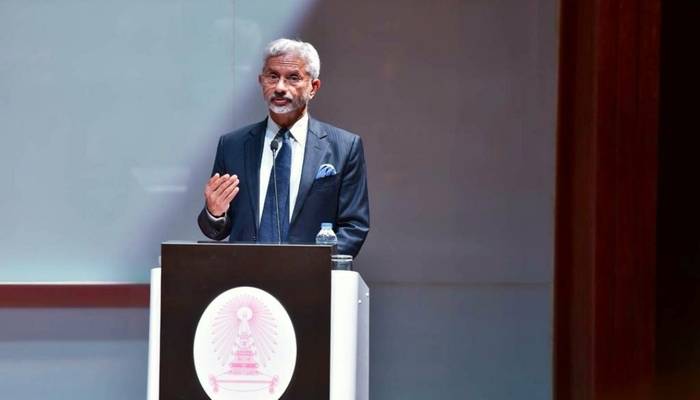Such a lateral connectivity can radically expand the interface between South-East Asia and South Asia, to the mutual benefit of both, he argued…reports Asian Lite News
India envisages a free, open, and inclusive Indo-Pacific region based on a rules-based international order, External Affairs Minister S Jaishankar reiterated on Thursday, even as made a strong case for a more collaborative outlook that transcends the orthodoxy of earlier theatres.
Speaking on ‘India’s Vision of the Indo-Pacific’ at the prestigious Chulalongkorn University in Bangkok, Thailand, he also described the Quad as the most “prominent” platform in the region.
“Only those whose mindsets are built around spheres of influence and who are uncomfortable with the democratization of world affairs will dispute the Indo-Pacific today,” EAM Jaishankar stressed, in a thinly-veiled reference to China.
The remarks came even as China flexes its muscles in the strategically important region.
“We envisage a free, open, inclusive, peaceful, and prosperous Indo-Pacific region, one which is built on a rules-based international order, sustainable and transparent infrastructure investment, freedom of navigation and over-flight, unimpeded lawful commerce, mutual respect for sovereignty, peaceful resolution of disputes, as well as equality of all nations,” EAM Jaishankar said.
Referring to “collective concerns for the global commons,” EAM Jaishankar said it was no longer feasible for any one country to assume all the burdens and a more collaborative outlook that transcends the orthodoxy of earlier theatres is the need of the day.
‘Asean at the centre’
EAM Jaishankar added that India envisages the Association of Southeast Asian Nations (ASEAN) to be at the centre of the Indo-Pacific, both literally and substantively. “Our ASEAN partners will surely note that our interactions with them have grown, not reduced, as a result of the Indo-Pacific,” he remarked.
According to EAM Jaishankar, the Quad is the most prominent plurilateral platform that addresses contemporary challenges and opportunities in the Indo-Pacific. Pointing out that the energies of the Quad are directed at a very broad range of activities, he expressed the confidence that the entire Indo-Pacific region will benefit from its activities.
“And that is validated by the growing recognition of its importance in the international community. If there are reservations in any quarter, these stem from a desire to exercise a veto on the choices of others. And possibly a unilateralist opposition to a collective and cooperative endeavours,” he said in a thinly-veiled reference to China which has expressed its objection to the concept of the Quad on several occasions.
He also spoke of connectivity, saying the India-Myanmar-Thailand Trilateral Highway has the potential of creating a completely new axis of economic activity in Asia. Such a lateral connectivity can radically expand the interface between South-East Asia and South Asia, to the mutual benefit of both, he argued.
During his address, he also explained that the prospects for the global order depend very much on a more equitable and democratic distribution of power and resources. “For that to happen, the world must obviously be more multi-polar. And such a multi-polar world must necessarily have a multi-polar Asia at its centre,” EAM Jaishankar remarked.
“Our expectation is that individually, bilaterally and collectively with the ASEAN, we contribute to the emergence of a more stable, secure and prosperous Indo-Pacific,” he added.
‘Thailand a key asean state’
Describing Thailand as a key ASEAN state and the second largest economy in Southeast Asia, he pointed out that India and Thailand are marking the 75th year of their diplomatic relations this year. “India looks forward to work closely with Thailand for its active participation in the implementation and progress of our vision in the Indo-Pacific,” EAM Jaishankar added.
He also referred to Thailand as “a civilizational neighbour, as also an economic, political, maritime and increasingly, a strategic neighbour”.
On Wednesday, EAM Jaishankar had co-chaired the 9th Meeting of the India-Thailand Joint Commission (JCM) with Thailand’s Deputy Prime Minister and Minister of Foreign Affairs Don Pramudwinai.
According to the Ministry of External Affairs (MEA), the Ministers discussed wide ranging issues of mutual interest and reviewed the progress made in various areas, including political, defence & security, economic & commercial, connectivity, cultural, tourism and people-to-people ties
Both sides also exchanged views on regional and multilateral issues of mutual interest and reiterated their commitment to further strengthen the multi-dimensional partnership that exist between the two countries, the MEA added.
EAM Jaishankar addressed and interacted with the Indian Community in Thailand and spoke about the special occasion of the 75th anniversary of India’s Independence which also coincided with the 75th anniversary of establishment of India-Thailand diplomatic relations.
During his stay, he also called on Prime Minister of Thailand Gen. Prayut Chan-o-Cha and conveyed personal greetings and good wishes from Prime Minister Narendra Modi. (India News Network)
ALSO READ-India, China to join Russian war games

Leave a Reply